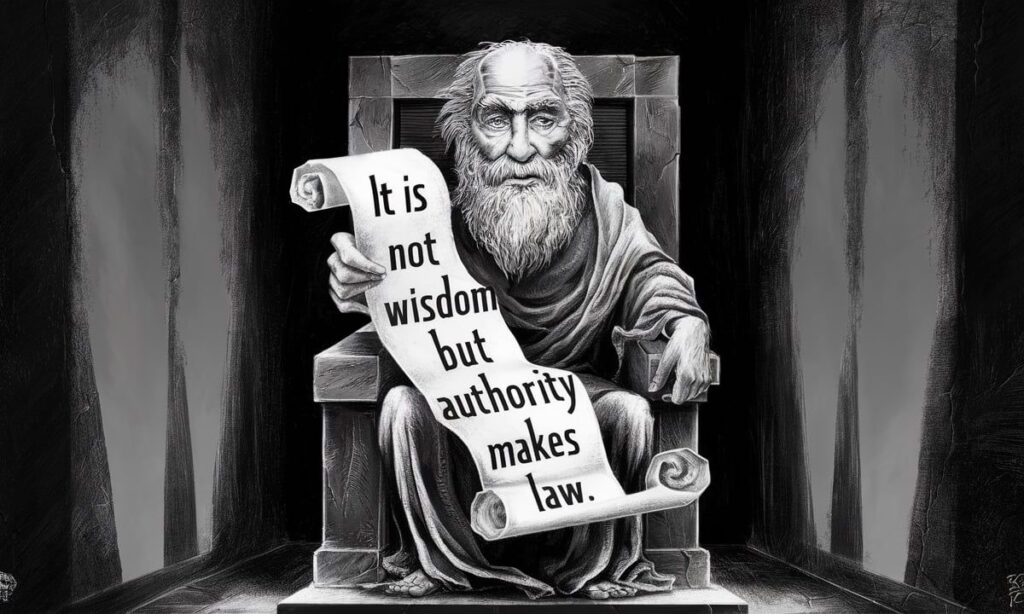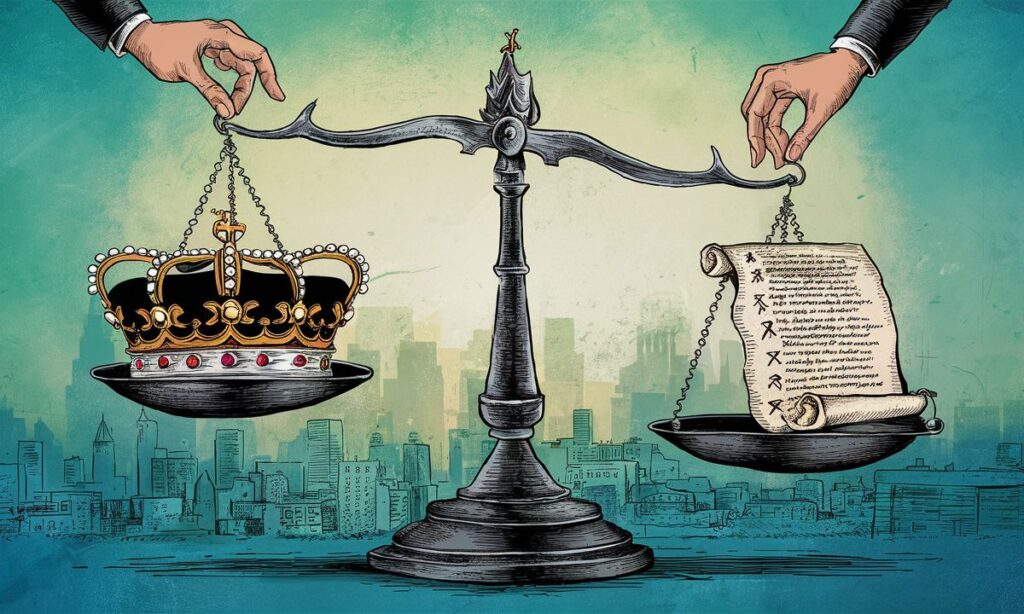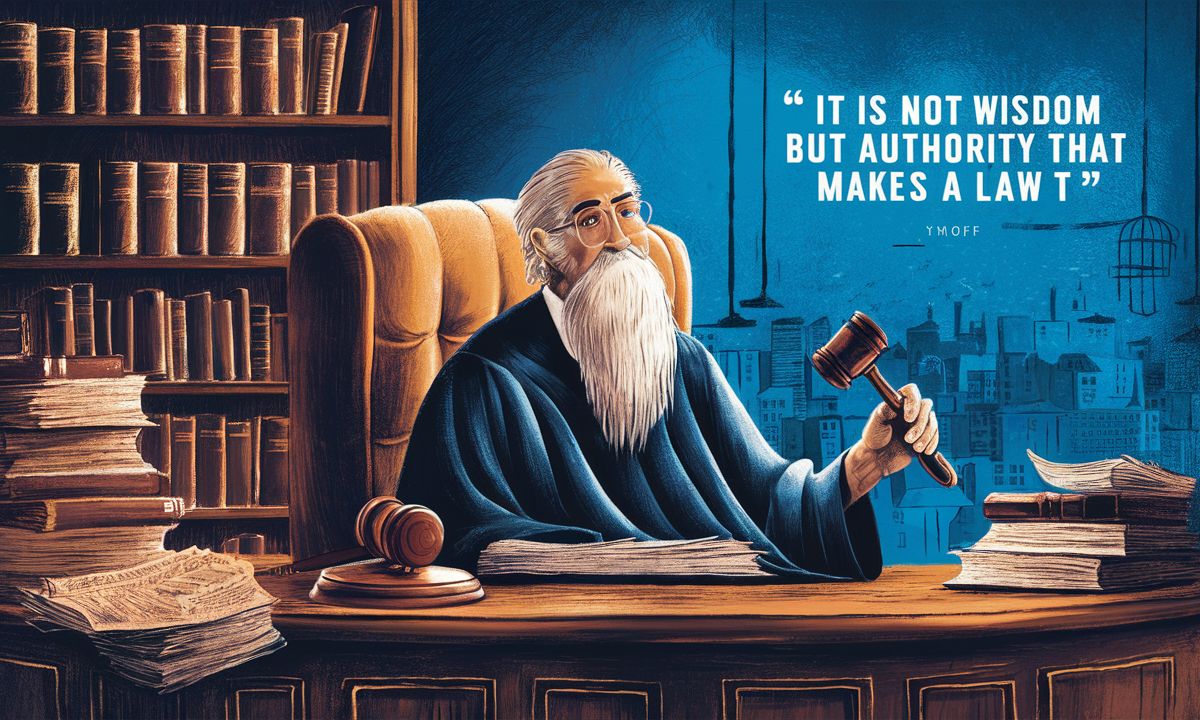It Is Not Wisdom But Authority That Makes A Law T – Tymoff” underscores the indispensable role of authority in establishing and enforcing laws. While wisdom provides the moral and intellectual foundation for creating fair and just rules, it lacks the power to implement them without recognized authority.
Authority gives legitimacy and enforceability to laws, ensuring societal order and compliance. Tymoff’s perspective highlights the practical reality that wisdom, no matter how profound, remains ineffective without the structured power to uphold it.
This balance between wisdom and authority is essential to building legal systems that are both rational and respected, emphasizing that governance requires more than just intellectual insight—it demands the authority to act.
Table of Contents
- It Is Not Wisdom But Authority That Makes A Law T – Tymoff
- The Role of Authority in Lawmaking and Its Necessity
- Legitimacy of Laws
- Enforcement and Compliance
- Stability of Society
- How Wisdom and Authority Complement Each Other in Lawmaking
- The Difference Between Law and Wisdom
- Challenges in Balancing Wisdom and Authority in Lawmaking
- FAQs About Authority, Wisdom, and Lawmaking
It Is Not Wisdom But Authority That Makes A Law T – Tymoff

The quote “It is not wisdom but authority that makes a law,” by T. Tymoff, highlights the fundamental role of authority in shaping and enforcing laws. While wisdom might provide moral guidance and ethical reasoning,
it is the authority vested in governing entities that transforms ideas into enforceable laws. Authority ensures compliance, legitimacy, and societal stability, making it indispensable to any legal system.
This article delves into the interplay between wisdom and authority in lawmaking, exploring their complementary roles and the challenges they present. By understanding how authority drives the enforcement of laws and how wisdom contributes to their fairness, we gain a comprehensive view of the legal systems that govern our societies.
Laws without authority remain theoretical, while authority without wisdom risks creating oppressive regimes. The balance between these two is critical for fostering justice and equity.
Throughout history, societies have grappled with this balance. Examples abound of laws imposed purely through authority but later contested for lacking ethical wisdom. Conversely, wise principles have often been rendered ineffective due to the absence of authoritative backing. This dynamic reveals the inherent tension between ideals and practicality in governance.
Authority also reflects the collective will of a society, expressed through elected officials, judicial systems, and enforcement agencies. Without authority, even the wisest laws would fail to achieve their purpose, as compliance would be left to personal discretion. However, authority must be exercised responsibly to avoid misuse, which could lead to tyranny.
Wisdom, on the other hand, acts as a moral compass, ensuring laws align with universal values like justice, equality, and freedom. It offers a lens through which authority can be critiqued and held accountable. Together, wisdom and authority form the backbone of any robust legal framework, ensuring laws serve their intended purpose while respecting human dignity.
also read :Geekzilla Tio Geek: The World of Geek Culture
The Role of Authority in Lawmaking and Its Necessity

Authority is the backbone of lawmaking, granting legitimacy and enforceability to rules and regulations. Let’s examine its critical roles.Authority provides the structure necessary for governance, ensuring laws are not merely suggestions but binding rules that guide societal behavior. It enforces compliance, deterring actions that could disrupt social harmony and order.
Without authority, laws would lack the power to influence behavior or resolve conflicts, rendering them ineffective in practice.
Moreover, authority acts as the voice of the collective will, representing the interests of the people through institutions like legislatures, courts, and law enforcement agencies. It bridges the gap between theoretical ideals and real-world application, translating societal values into actionable policies. This ensures that laws remain relevant and aligned with the evolving needs of the community.
Another essential role of authority is in maintaining uniformity and fairness. By applying laws consistently across all segments of society, authority fosters a sense of justice and equality. It ensures that no individual or group is above the law, thus protecting the rights of citizens and maintaining trust in the legal system.
Authority is also crucial for resolving disputes and mitigating conflicts. It provides a neutral framework for addressing grievances, ensuring decisions are made based on established laws rather than subjective opinions. This reinforces social stability and minimizes the risk of chaos or vigilantism.
Furthermore, authority plays a proactive role in shaping future societal norms. Through its power to create and amend laws, it can address emerging challenges, promote innovation, and ensure sustainable development. This forward-thinking aspect highlights the dynamic nature of authority in lawmaking.
However, authority is not without its challenges. It must be exercised responsibly, with checks and balances to prevent misuse or overreach. An unchecked authority risks becoming authoritarian, undermining the very principles it is meant to uphold. Therefore, transparency and accountability are vital to maintaining the legitimacy of authority in lawmaking.
In summary, authority is indispensable in lawmaking, serving as the foundation upon which legal systems operate. It ensures compliance, promotes justice, resolves conflicts, and adapts to societal changes, all while safeguarding the collective good.
Legitimacy of Laws
Authority provides laws with the legitimacy required to be binding on individuals and institutions. Without this legitimacy, laws are merely suggestions or ideals.
For example, consider environmental protection laws. While the rationale behind these laws may stem from ethical wisdom about conserving nature, they only become enforceable when passed by authoritative legislative bodies. The processes of drafting, debating, and enacting laws rely on the authority granted to lawmakers by the constitution or other governing frameworks.
| Aspect | Role of Authority |
| Legislative Approval | Authority ensures laws are debated and approved by recognized institutions. |
| Public Compliance | Authority commands adherence through legal backing. |
| Enforcement Mechanisms | Institutions like courts and police enforce laws backed by state authority. |
Enforcement and Compliance
Enforcement is the practical application of authority, ensuring laws are obeyed. Law enforcement agencies operate under the authority granted by the state, administering consequences for violations.
For instance, traffic laws aim to ensure public safety. However, without police enforcing penalties for violations, such as speeding, these laws would fail to achieve their purpose. Authority ensures individuals comply with rules, maintaining societal order. Enforcement mechanisms instill accountability, reminding individuals of the repercussions of non-compliance.
The process of enforcement is not limited to punishment; it also includes monitoring and preventive measures. Surveillance systems, checkpoints, and public awareness campaigns complement direct enforcement, ensuring citizens understand and adhere to the law. For example, campaigns about the dangers of drunk driving often work hand-in-hand with strict penalties to reduce accidents.
Moreover, compliance driven by enforcement reinforces the credibility of the legal system. When citizens observe laws being uniformly enforced, their trust in governance increases. This trust encourages voluntary adherence to laws, reducing the overall need for stringent enforcement.
In areas like environmental protection, enforcement ensures businesses and individuals follow regulations designed to preserve natural resources. Without penalties for violations, such as illegal dumping or overfishing, these laws would fail to protect ecosystems effectively. Similarly, workplace safety laws depend on enforcement to safeguard employee well-being, preventing exploitation and hazardous conditions.
Enforcement also plays a pivotal role in upholding human rights. Laws against discrimination, harassment, and abuse require active enforcement to ensure marginalized groups receive the protection and justice they deserve. By taking action against offenders, authorities set precedents that deter future violations.
However, enforcement must be balanced and fair. Disproportionate or selective enforcement can erode public confidence and lead to perceptions of injustice. For example, biased law enforcement practices can deepen societal divisions and undermine the legitimacy of the legal system.
Technological advancements have enhanced enforcement capabilities, with tools like AI surveillance, traffic cameras, and forensic analysis improving accuracy and efficiency. These innovations allow for more effective monitoring, ensuring compliance while reducing the margin for error.
Ultimately, enforcement is the bridge between authority and societal order. It transforms abstract laws into tangible actions, ensuring rules are respected and followed for the greater good.
Stability of Society
Authority’s most vital role is maintaining stability. By providing a clear framework of acceptable behavior, authority-backed laws prevent chaos and ensure harmony.
Consider labor laws that protect workers’ rights. These laws, backed by authority, ensure fair treatment for employees across various sectors. Such standardization fosters trust and stability within the workforce, creating a predictable and peaceful societal environment. Similarly, laws governing property rights help prevent disputes, allowing individuals and businesses to operate with confidence and security.
Authority also ensures societal stability by addressing inequalities. Through taxation policies, welfare programs, and anti-discrimination laws, governing bodies work to reduce disparities and promote social cohesion. Education policies, for instance, enforce equal access to schooling, which contributes to long-term stability by empowering future generations.
In addition, public health laws ensure that society remains functional during crises, such as pandemics. Authority-backed measures like vaccination mandates and quarantine regulations help mitigate risks and protect public safety. The consistent application of these laws reassures citizens that their well-being is a priority.
Stability further depends on the enforcement of criminal laws, which deter unlawful behavior and protect citizens from harm. When people feel secure in their communities, trust in authority increases, strengthening the social fabric. Through these mechanisms, authority sustains the equilibrium necessary for progress and harmony.
How Wisdom and Authority Complement Each Other in Lawmaking

While authority is the force behind the application of laws, wisdom ensures these laws are just and beneficial. Together, they create a balanced legal system. Authority, in its essence, comes from the power vested in lawmakers, leaders, or institutions that create and enforce laws. This power ensures that laws are followed and penalties are applied when necessary, maintaining order in society.
However, without wisdom, laws might be implemented in ways that are unjust or oppressive, disregarding the nuances of human behavior and societal needs. Wisdom, on the other hand, brings thoughtful consideration to the lawmaking process, ensuring that the laws created are not just legal but also moral and equitable.
It encourages lawmakers to consider the broader impact of their decisions on individuals and communities, fostering a sense of fairness. Authority without wisdom could lead to the enactment of rigid laws that may not address the complexities of modern society. Wisdom tempers authority, guiding it toward better outcomes for all.
When wisdom is coupled with authority, laws are not only enforced but are also designed to evolve with society’s changing values and needs. It ensures that the legal system is not just about power, but also about protecting the rights and well-being of individuals.
Therefore, the interplay between wisdom and authority forms the foundation of a legal system that is both effective and just. This balance is crucial in maintaining public trust in the legal system and ensuring that the laws serve their true purpose of safeguarding justice.
The Role of Wisdom
Wisdom brings ethical and practical insights to lawmaking. It involves input from philosophers, legal experts, and social scientists who analyze societal needs and propose fair solutions. For instance, anti-discrimination laws are rooted in wisdom about equality and human dignity.
The Role of Authority
Authority institutionalizes wisdom, translating it into actionable laws. It ensures these laws are enforced and adhered to by society at large. Without authority, wisdom remains an abstract concept with limited impact.
| Element | Wisdom’s Contribution | Authority’s Role |
| Law Creation | Provides ethical and logical guidance | Ensures laws are codified and enacted |
| Implementation | Suggests best practices | Enforces rules consistently |
| Societal Impact | Promotes fairness and equity | Maintains order and compliance |
The Difference Between Law and Wisdom

Laws and wisdom serve different but interconnected purposes in society. Here’s how they differ: Laws are formalized rules and regulations that are created by governing bodies and enforced by institutions to maintain order and ensure justice.
They are clear, specific, and objective, providing a structure for how individuals and organizations should behave. Wisdom, on the other hand, is the ability to make sound judgments based on experience, understanding, and insight. It is not confined to written rules and often involves flexibility and nuance in decision-making.
While laws provide a framework for acceptable behavior, wisdom helps individuals navigate complex situations where rules may not be entirely applicable or sufficient. Laws are often reactive, addressing issues that have already arisen, whereas wisdom is proactive, guiding people to avoid harm and make better choices.
In society, laws can only go so far in addressing the complexities of human behavior, which is where wisdom plays an essential role in interpreting and applying these laws. While laws establish boundaries, wisdom fills in the gaps, ensuring that justice is done in both letter and spirit.
Nature
- Wisdom: Broad and abstract, encompassing moral reasoning and ethical insights.
- Law: Concrete and specific, comprising rules enforced by authority.
Function
- Wisdom: Guides the development of fair and equitable laws.
- Law: Mandates behavior and ensures compliance through penalties.
For example, wisdom may inspire the principle of freedom of speech, but laws define its limits to prevent harm, such as hate speech. This collaboration ensures societal harmony while respecting individual rights.
Challenges in Balancing Wisdom and Authority in Lawmaking
Balancing wisdom and authority is not without challenges. Here are some common issues:
Political Interference
Authorities may prioritize political or economic interests over public welfare. For instance, lobbying by powerful industries can lead to diluted environmental laws that fail to protect natural resources effectively.
Lack of Enforcement
Even the wisest laws can fail if enforcement mechanisms are weak. In regions plagued by corruption, laws against bribery may exist but remain unenforced due to compromised authority.
Overemphasis on Authority
Laws driven solely by authority without ethical consideration can be oppressive. Historical examples, such as authoritarian regimes, demonstrate how laws can perpetuate injustice when detached from wisdom.
| Challenge | Impact on Lawmaking |
| Political Influence | Undermines public trust and effectiveness of laws. |
| Weak Enforcement | Leads to non-compliance and societal disorder. |
| Authority Without Wisdom | Results in unjust or harmful regulations. |
FAQs About Authority, Wisdom, and Lawmaking
What is the primary role of authority in lawmaking?
Authority provides legitimacy and ensures laws are enforceable, maintaining societal order.
Can laws be created without wisdom?
While possible, laws lacking wisdom may be ineffective or unjust, failing to address societal needs adequately.
Why is the relationship between wisdom and authority important in lawmaking?
Wisdom ensures laws are fair and ethical, while authority enforces them, creating a functional legal system.
How do authority and wisdom complement each other in law enforcement?
Wisdom guides the creation of just laws, while authority ensures consistent application and compliance.
Can authority alone create effective laws?
No, laws based solely on authority may lack fairness and societal acceptance. Wisdom is essential for their effectiveness.
Conclusion
The interplay between wisdom and authority is central to effective lawmaking. While wisdom provides the moral and ethical foundation for laws, authority ensures their implementation and adherence. Together, they form the bedrock of a stable and just society.
As societies evolve, the balance between wisdom and authority must be carefully maintained. Laws that harmonize ethical considerations with enforceable mandates can address the complex challenges of modern governance, ensuring fairness, stability, and progress for all.
more more detalies visit Qavasaki

David is a seasoned SEO expert with a passion for content writing, keyword research, and web development. He combines technical expertise with creative strategies to deliver exceptional digital solutions.












